11 Best Email Deliverability Tools in 2025
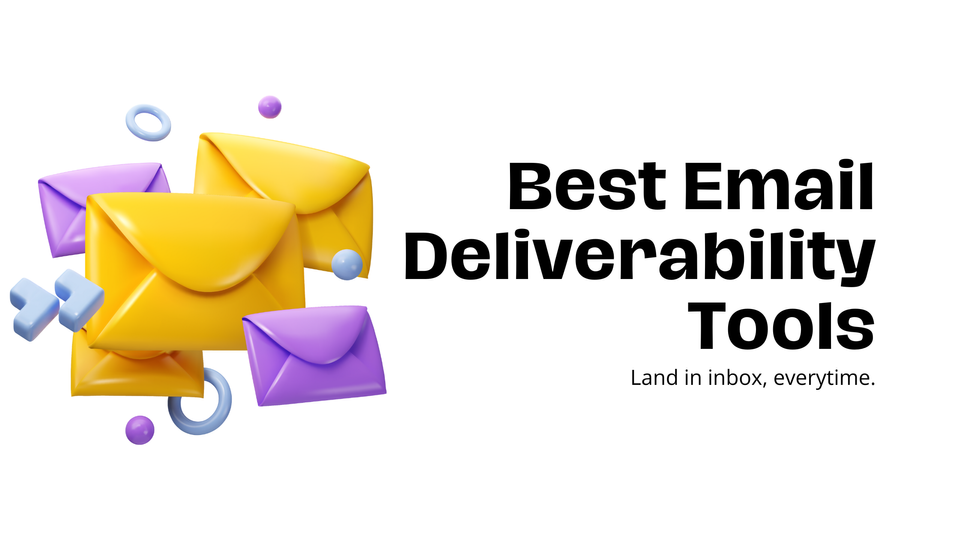
As email marketing experts with years of experience testing email deliverability tools, we've compiled a data-driven, expert-reviewed list of the most effective solutions for 2025. Whether you're a startup, enterprise, or solo marketer, these tools will help you:
✔ Check & fix deliverability issues (blacklist monitoring, domain reputation analysis)
✔ Authenticate & secure emails (SPF, DKIM, DMARC setup)
✔ Clean & verify your email lists (reduce bounces, increase engagement)
✔ Optimize inbox placement (real-time monitoring, spam testing)
🔍 We tested these email deliverability tools across different email platforms, ISPs, and marketing setups to ensure reliable, real-world results.
Let’s break down the top tools to help you improve open rates, boost conversions, and protect your sender reputation.
What is Email Deliverability?
Email deliverability ensures your messages reach recipients' inboxes, not spam folders or blocked by servers.
It relies on factors like sender reputation, authentication protocols (SPF, DKIM, DMARC), content quality, list hygiene, and sending practices.
Sender reputation, influenced by engagement and complaint rates, plays a significant role. Authentication protocols confirm sender legitimacy and reduce spam. Content quality, list cleanliness, and proper sending practices also matter.
Monitoring feedback loops from ISPs helps address spam complaints promptly to maintain a positive reputation. Building good relations with ISPs can enhance deliverability, with some offering whitelisting or certification.
High deliverability is vital for successful email marketing and communication.
What are Email Deliverability Tools?
Email deliverability tools are software designed to help businesses ensure their emails reach recipients' inboxes reliably. These tools offer features to monitor, analyze, and enhance email delivery practices. Common features include:
Email Authentication: Tools manage authentication protocols like SPF, DKIM, and DMARC to verify sender authenticity. Learn more about SPF, DKIM, and DMARC here.
IP and Domain Reputation Monitoring: They monitor sender IP and domain reputations across blacklists and reputation services to prevent spam flagging.
Email Testing and Preview: Tools allow testing emails across various clients, devices, and spam filters to ensure proper rendering and avoid spam classification.
Email List Hygiene: To ensure clean email lists, remove invalid addresses, duplicates, and inactive subscribers. For optimal results, consider using a dedicated email verifier tool like Skrapp to eliminate invalid addresses.
If you regularly send campaigns to large lists, a bulk email service will help manage high-volume sending while maintaining deliverability and compliance.
Campaign Analytics: These tools offer insights into email performance, including open rates, click-through rates, and bounce rates, to optimize future campaigns.
ISP Feedback Loop Integration: They connect with ISPs' feedback loops to receive notifications about delivery issues and spam complaints, enabling timely action.
Content Analysis: Some tools assess email content for potential spam triggers, offering improvement suggestions to avoid spam classification.
A/B Testing: These tools facilitate A/B testing of various email elements (subject lines, sender names, content) to identify the most effective strategies for enhancing deliverability and engagement.
Deliverability Monitoring: They constantly monitor email deliverability metrics and issue alerts or reports when problems occur, enabling quick resolution.
Compliance Assistance: These tools aid in complying with email regulations like GDPR and CAN-SPAM Act by offering guidance on permission-based marketing practices and opt-in/opt-out management.
Summary of the Best Email Deliverability Tools
1. Mailtrap

Pricing:
- Free | $0
- Basic | $15
- Business | $85
- Enterprise | $750
- Custom | pricing based on requirements
Pros:
- High inboxing rates and fast delivery
- Flexible and customizable email API
Cons:
- Limited number of native integrations
Ideal for: Digital product companies looking for a reliable, developer-friendly platform for sending emails with high inboxing rates.
2. Mail Tester

Pricing: FREE
Pros:
- Simple and easy-to-use tool for testing email deliverability.
- Provides a quick score indicating the likelihood of an email being delivered to the inbox.
Cons:
- Limited features compared to more comprehensive tools.
Ideal for: Small businesses and individuals looking for a quick and easy way to test email deliverability.
3. GlockApps

Pricing:
- Free | $0
- Essential | $85
- Growth | $142
- Enterprise | $185
Pros:
- Advanced email deliverability testing including inbox placement testing across various ISPs.
- Provides detailed analytics and reporting.
Cons:
- Pricing may be higher compared to some other tools.
Ideal for: Marketing teams and email marketers focused on maximizing inbox deliverability and improving email campaign performance.
4. MxToolbox

Pricing:
- Free | $0
- Delivery Center | $129
- Delivery Center Plus | $399
Pros:
- Comprehensive suite of email deliverability tools including blacklists monitoring, SPF, DKIM, and DMARC record validation.
- Offers in-depth diagnostics and reports.
Cons:
- User interface may not be as intuitive compared to other tools.
Ideal for: Small to large businesses looking for a comprehensive suite of email deliverability tools.
5. Warmy

Warmy Pricing:
- Starter | $49
- Business | $129
- Premium | $189
- Expert | $279
- Platinum | $429
Pros:
- Focus on warming up email addresses gradually to improve deliverability.
- Automated warm-up process saves time for users.
Cons:
- Limited features beyond warming up email addresses.
Ideal for: Businesses, especially those using cold outreach or email marketing, looking to improve their sender reputation through gradual warm-up.
6. Bouncer
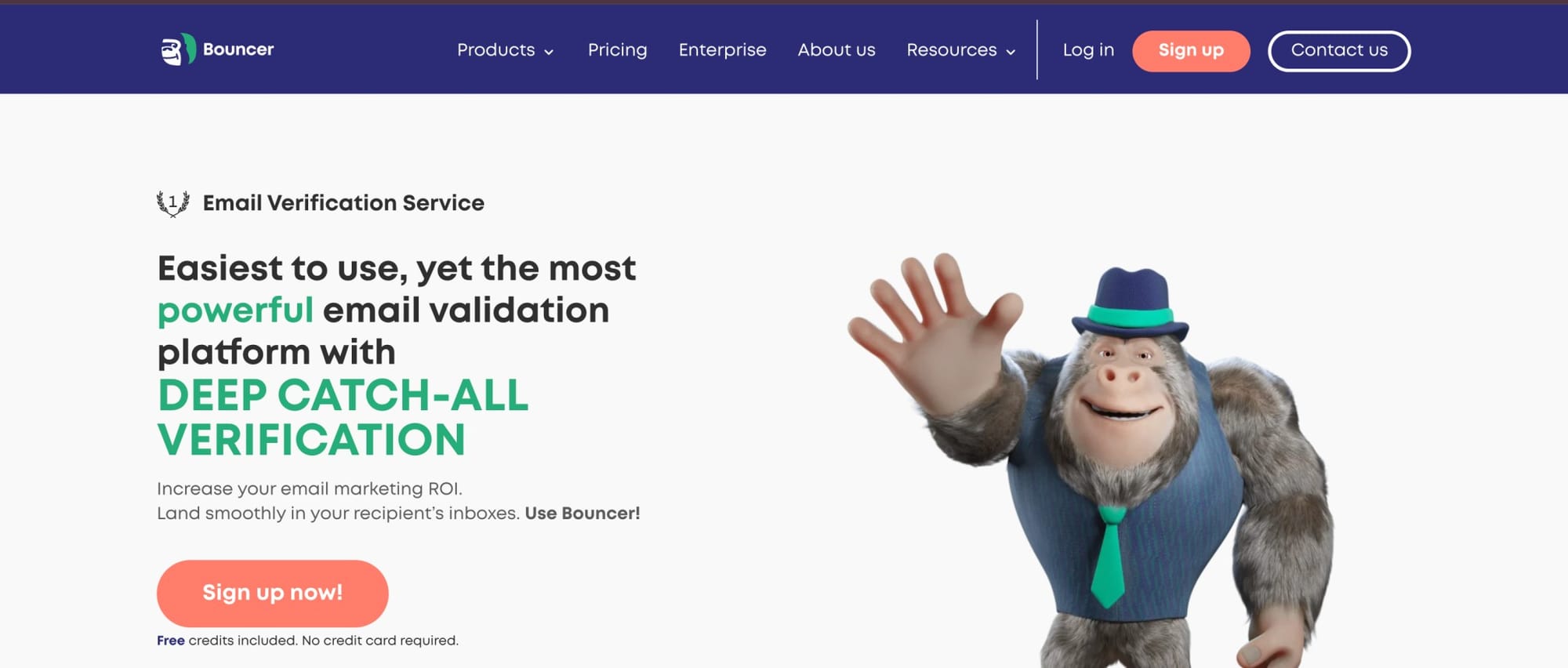
Pricing: Starts from $8/month for 1000 credits.
Pros
- Bouncer offers 99.5% email verification accuracy, improving deliverability by reducing bounce rates.
- Simple interface makes integration and operation easy.
- Provides prompt, friendly customer service.
Cons
- Pricing may be higher compared to some other tools.
- Issues with uploading certain file types.
Idea for: For marketing agencies, enterprises, and SaaS
7. InboxAlly
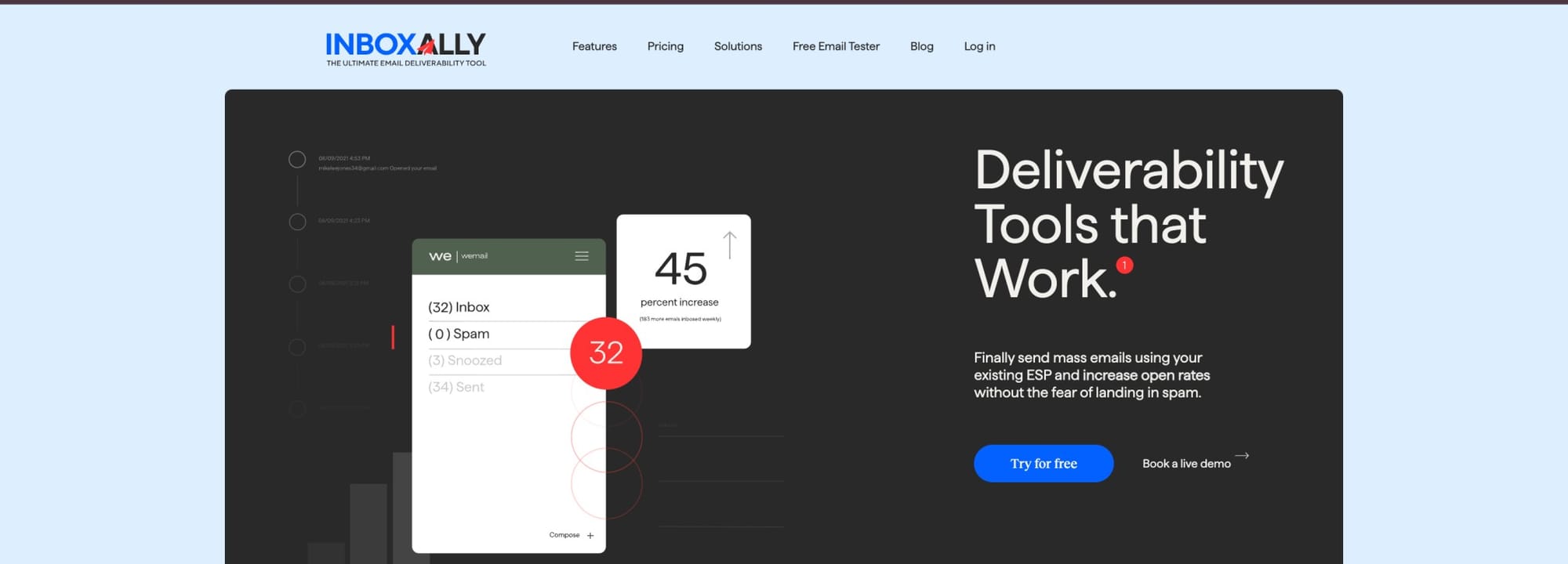
Pricing:
- Starter | $149/month
- Plus | $645
- Premium | $1190
- Enterprise | Contact for pricing
Pros:
- InboxAlly’s email warm-up service provides a structured ramp-up schedule that significantly shortens the time required to establish a good sender reputation.
- Preset sender profiles to ensure you apply the best practices without needing extensive expertise.
- Real-time tracking & detailed reports
- Verifies your existing email list to remove duplicates & emails that no longer exist
Cons:
- Chat support is only available on the Plus plan and above, although email support is available on the Starter Plan.
- It's pricier than others on the list.
Ideal for: Small businesses and performance marketing agencies that need a robust email marketing tool that gets results fast.
8. Mail Genius
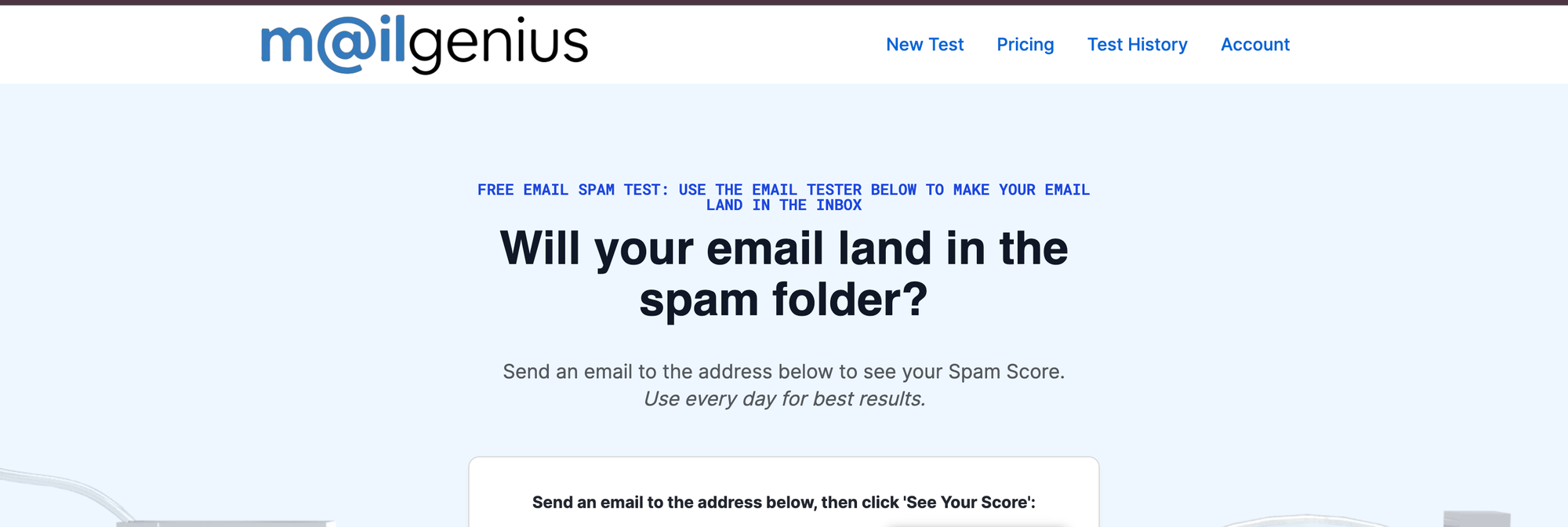
Pricing:
- Newbie | $10
- Standard | $25
- Genius | $49
Pros:
- Offers real-time email deliverability monitoring.
- Provides actionable insights to improve email deliverability.
Cons:
- May lack some advanced features compared to other tools.
Ideal for: Businesses of all sizes seeking real-time monitoring and actionable insights for improving email deliverability.
9. Email on Acid
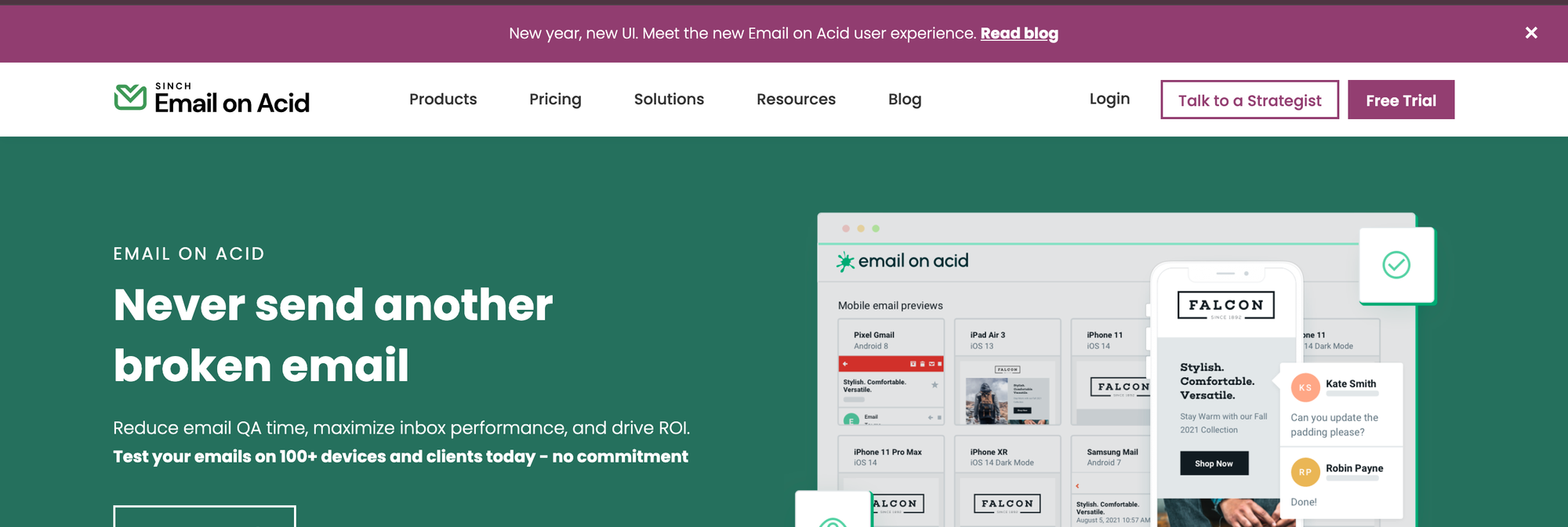
Pricing:
- The Basics | $74
- Premium | $134
- Enterprise | Contact Sales
Pros:
Comprehensive email testing platform including email rendering, spam testing, and accessibility testing.
Offers integration with popular email marketing platforms.
Cons:
Pricing may be higher compared to some other tools.
Ideal for: Marketing teams and email developers needing comprehensive email testing across different devices, email clients, and spam filters.
10. Lemwarm
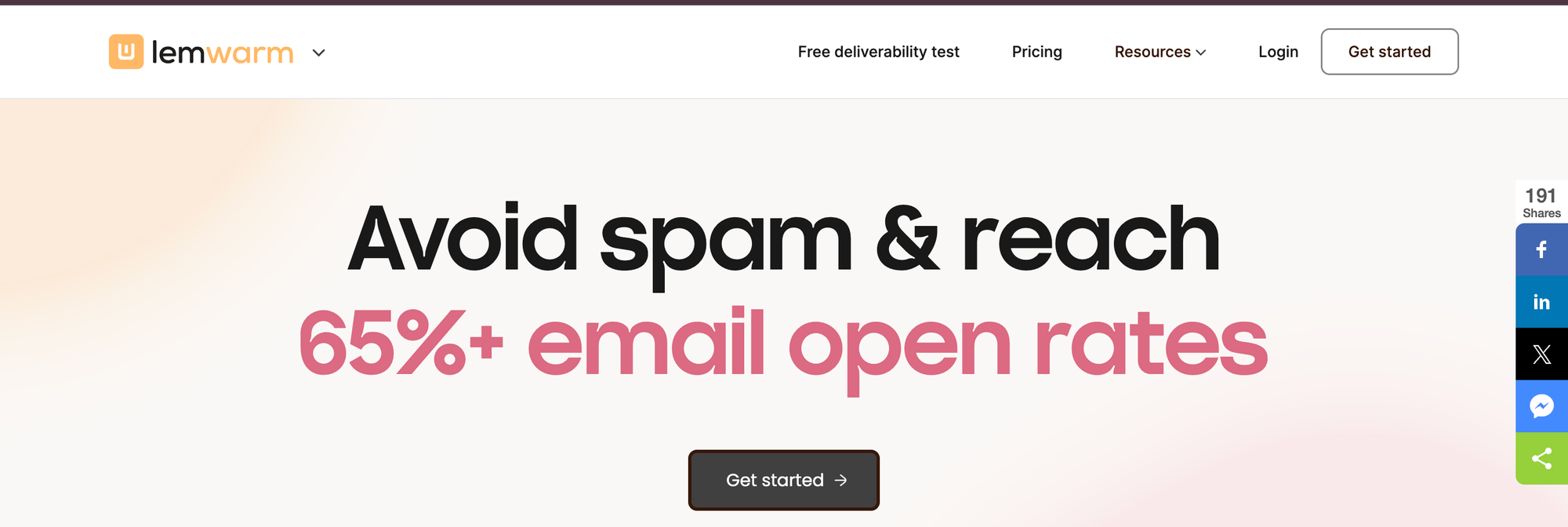
Pricing:
- Essential | $29
- Smart | $49
Pros:
- Focus on warming up email addresses gradually to improve deliverability.
- Automated warm-up process saves time for users.
Cons:
- Limited features beyond warming up email addresses.
Ideal for: Businesses, especially those using cold outreach or email marketing, looking to improve their sender reputation through gradual warm-up.
11. Everest by Validity

Pricing: Contact Sales
Pros:
- Offers a range of email deliverability solutions including email verification, monitoring, and optimization.
- Integration with Salesforce and other CRM platforms.
Cons:
- Pricing may be on the higher side.
Ideal for: Enterprises and large businesses needing advanced email deliverability solutions integrated with their CRM systems.
Why Email Delivery Matters
Communication Effectiveness: Email serves as a primary communication channel for businesses, organizations, and individuals. Ensuring messages reach recipients enables effective communication, collaboration, marketing, and customer support.
Business Reputation: Email delivery directly impacts sender reputation. Consistently landing emails in inboxes builds trust and credibility, while poor deliverability harms reputation and brand image.
Marketing Success: Email marketing is crucial for businesses to promote products, services, events, and engage with customers. High deliverability rates increase the visibility of marketing emails, enhancing chances of achieving desired outcomes like conversions and sales.
Customer Engagement: Email effectively engages customers, prospects, and stakeholders through newsletters, updates, promotions, and transactional emails. Reliable delivery keeps recipients informed and engaged with the sender's content and offerings.
Cost Efficiency: Businesses invest in email marketing campaigns, including design, content creation, and automation tools. Optimizing email deliverability ensures these investments reach the intended audience and drive desired actions, avoiding waste on undelivered emails.
Data Insights: Email delivery metrics offer insights into campaign effectiveness, including open rates, click-through rates, bounce rates, and engagement. Analyzing these metrics helps optimize email strategies for better performance and ROI.
Email Deliverability Best Practices
Build a Quality Email List: Only email recipients who have opted in to receive communications. Avoid buying lists or adding contacts without permission.
Use Double Opt-In: Implement a process where subscribers confirm their subscription via email to ensure valid and engaged addresses.
Authenticate Your Emails: Set up SPF, DKIM, and DMARC to verify email authenticity and prevent spoofing and phishing. For example, having a strong DMARC policy can boost your sender reputation and email deliverability, whereas a weak policy might leave your messages flagged as suspicious.
Maintain Good Sender Reputation: Monitor sender reputation by checking domain and IP against blacklists. Follow best practices like sending relevant content, promptly honoring unsubscribe requests, and minimizing spam complaints.
Segment Your Email List: Divide your email list by demographics, interests, and past interactions. Customize content and frequency for each segment to boost engagement and decrease spam risk.
Personalize Your Emails: Personalized emails see higher open and engagement rates. Incorporate recipients' names, purchase history, or other relevant data into content and subject lines.
Optimize Email Content: Craft clear, valuable subject lines and content. With this resource from Superside, you can discover newsletter templates that can help you maintain consistent formatting and brand presentation. Avoid spam triggers like excessive punctuation or misleading claims that could trip spam filters.
Test and Monitor Deliverability: Regularly test emails across various platforms and devices. Keep an eye on metrics like open rates, click-through rates, bounce rates, and spam complaints to address issues promptly.
Clear Opt-Out Options: Include easy-to-find unsubscribe links and promptly honor requests to comply with regulations like CAN-SPAM Act and GDPR.
Feedback Loop Monitoring: Sign up for ISP feedback loops to promptly address spam complaints and maintain sender reputation.
Stay Informed: Keep abreast of email regulations and industry best practices to ensure compliance and uphold good sending practices. Make sure you also stay up-to-date with the components of email compliance.
Also read:
- Best Newsletter Platforms for Creators, Beginners, to Enterprise Marketers
- Best Email Tracking Software to Integrate with your Gmail and Outlook
- Best Cold Email Software [Gmail / GSuite Integration]
- Best Email Marketing Platforms for Marketers
- Best Email Signature Generators
- Best Email Tracking Software
- Best Email Warmup Tools
Did We Miss Any Names?
If we missed anything, feel free to reach out and tell us which email deliverability tool you prefer, along with its pros and cons, and we will update the list.
In the meantime, if you need help with building your prospect list, try Skrapp to reach out to the right people. You can use our LinkedIn finder extension, People Search, to comb through our database, and finally, verify the email addresses to avoid sending them to the deactivated accounts.
